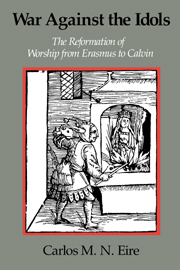Book contents
- Frontmatter
- Contents
- Acknowledgments
- Abbreviations
- INTRODUCTION
- 1 THE STATE OF LAY DEVOTION IN THE LATE MIDDLE AGES
- 2 ERASMUS AS CRITIC OF LATE MEDIEVAL PIETY
- 3 EARLY REFORMERS AND THE QUESTION OF IDOLATRY
- 4 ICONOCLASM, REVOLUTION, AND THE REFORMATION IN SWITZERLAND AND GENEVA, 1527–1536
- 5 HUMANISM AND REFORM IN FRANCE: THE SEEDS OF CALVINISM
- 6 JOHN CALVIN'S ATTACK ON IDOLATRY
- 7 CALVIN AGAINST THE NICODEMITES
- 8 FROM ICONOCLASM TO REVOLUTION: THE POLITICAL DIMENSIONS OF THE WAR AGAINST IDOLATRY
- CONCLUSION
- Index
INTRODUCTION
Published online by Cambridge University Press: 02 October 2009
- Frontmatter
- Contents
- Acknowledgments
- Abbreviations
- INTRODUCTION
- 1 THE STATE OF LAY DEVOTION IN THE LATE MIDDLE AGES
- 2 ERASMUS AS CRITIC OF LATE MEDIEVAL PIETY
- 3 EARLY REFORMERS AND THE QUESTION OF IDOLATRY
- 4 ICONOCLASM, REVOLUTION, AND THE REFORMATION IN SWITZERLAND AND GENEVA, 1527–1536
- 5 HUMANISM AND REFORM IN FRANCE: THE SEEDS OF CALVINISM
- 6 JOHN CALVIN'S ATTACK ON IDOLATRY
- 7 CALVIN AGAINST THE NICODEMITES
- 8 FROM ICONOCLASM TO REVOLUTION: THE POLITICAL DIMENSIONS OF THE WAR AGAINST IDOLATRY
- CONCLUSION
- Index
Summary
In 1509, when John Calvin was born, Western Christendom still shared a common religion of immanence. Heaven was never too far from earth. The sacred was diffused in the profane, the spiritual in the material. Divine power, embodied in the Church and its sacraments, reached down through innumerable points of contact to make itself felt: to forgive or punish, to protect against the ravages of nature, to heal, to soothe, and to work all sorts of wonders. Priests could absolve adulterers and murderers, or bless fields and cattle. During their lives, saints could prevent lightning from striking, restore sight to the blind, or preach to birds and fish. Unencumbered by the limitations of time and space, they could do even more through their images and relics after death. A pious glance at a statue of St. Christopher in the morning ensured protection from illness and death throughout the day. Burial in the habit of St. Francis improved the prospects for the afterlife. A pilgrimage to Santiago, where the body of the apostle James had been deposited by angels, or to Canterbury, where St. Thomas à Becket had had his skull split open by knights of King Henry II, could make a lame man walk, or hasten a soul's release from purgatory. The map of Europe bristled with holy places; life pulsated with the expectation of the miraculous. In the popular mind and in much of the official teaching of the Church, almost anything was possible.
- Type
- Chapter
- Information
- War against the IdolsThe Reformation of Worship from Erasmus to Calvin, pp. 1 - 7Publisher: Cambridge University PressPrint publication year: 1986



